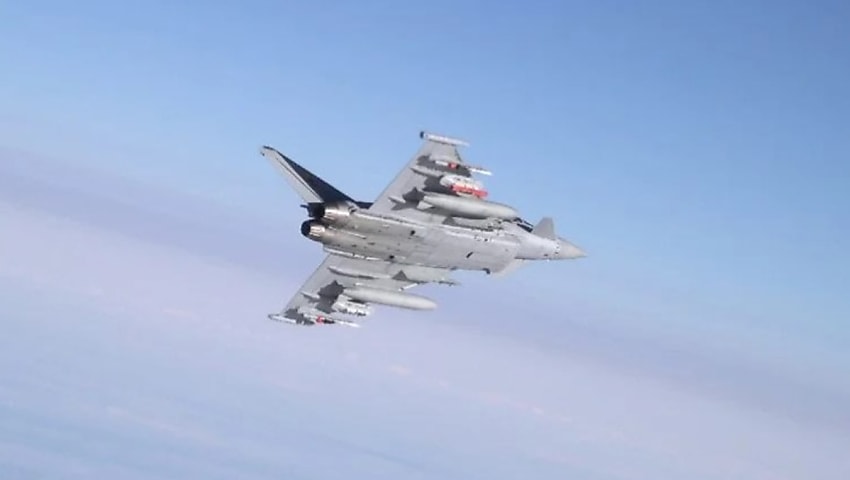The United Kingdom has conducted its first successful guided firing trial of the SPEAR turbojet-powered miniature cruise missile.
In a major improvement to the Royal Navy and Royal Air Force arsenal, the new cruise missile was fired from a BAE Systems-operated Typhoon jet at Vidsel range in Sweden.
The most recent trial was the first time the weapons system had been fired against a target, signifying a major leap forward in the program’s development.
Each missile can hit targets from 100 kilometres away and is designed to be used against a range of targets, including air defences, ships, tanks, defended structures and fast-moving vehicles.
The trial, which used a telemetry unit instead of a live warhead, demonstrated the release, gather and long-range free-flight control of the missile following a high-altitude and high-speed release.
“The successful trial of the pioneering SPEAR missile marks a significant leap forward in UK Armed Forces’ capabilities, ensuring our Royal Navy and Royal Air Force personnel are equipped with cutting-edge technology to protect our nation,” Minister for the Armed Forces Luke Pollard said.
“This achievement not only strengthens national defence capabilities but also boosts the UK economy, by supporting high-skilled jobs and innovation.”
Once in service, it will be fitted to Britain’s F-35B fighter jets and allow the military to strike targets both from land and Queen Elizabeth Class aircraft carriers.
SPEAR autonomously navigated to the target via customisable routes before using its advanced all-weather radar seeker to map the target area and used the radiofrequency imagery to successfully engage it.
“SPEAR is a truly unique weapon system – the first to offer the range, flexibility, precision and load-out to defeat modern enemy air defences,” said Mike Mew, tactical strike director of MBDA.
“The success of this trial is thanks to excellent joint working from teams across MOD, BAE Systems and MBDA.”
Developed in the UK by MBDA, work on SPEAR supports several hundred jobs among MBDA’s 5,500-strong UK workforce, with design work mainly in Stevenage and Bristol and manufacturing in Bolton.
“This trial was a key step on the way to delivering SPEAR to the UK front line, where it will provide a new capability to defeat the most complex air defence systems, enabling pilots to fly and fight wherever they’re needed in defence of the UK and its allies,” said Matthew Brown, SPEAR team leader at DE&S.
“The SPEAR program is being managed by Defence Equipment & Support (DE&S), the Ministry of Defence (MOD) procurement executive agency. A joint MOD and industry team conducted this first in a series of SPEAR guided flight trials.”
F-35B jets will be able to carry up to eight SPEAR missiles at a time, providing the next generation of long-range air-to-surface missiles. This guided firing trial marks a critical milestone in the development of the SPEAR program, which provides the next generation of stand-off air-to-surface missiles for Suppression of Enemy Air Defences missions in challenging and complex operating environments.
SPEAR is part of a wider portfolio which supports £6.5 billion of planned investment in the UK weapons industry by the MOD over the next decade, which includes other missile programs such as Brimstone, CAMM, Sea Viper, Sea Venom and Storm Shadow, putting the UK at the forefront of future weapons development.
“This successful firing from Typhoon is as a result of the hard work and outstanding collaboration between MBDA, MOD and BAE Systems personnel over many months,” said Chris Moon, BAE Systems’ UK delivery director for Typhoon capability.
“We now look forward to the next phase of SPEAR 3 trials, as well as delivering the testing of many other world-leading capabilities in support of the RAF Typhoon Force.”
Earlier this week, the US State Department announced it had made a determination approving a possible foreign military sale worth US$70 million on 18 November.
In addition, the Defense Security Cooperation Agency (DSCA) has delivered the required certification notifying Congress of the possible sale.
“The government of the United Kingdom has requested to buy 46 Tactical Combat Training System Increment II (TCTS II) air combat training systems. The following non-MDE items will also be included: containers; integration and test support; spare and repair parts; publications and technical documentation; personnel training and training equipment; US government and contractor engineering, technical, and logistics support services; and other related elements of logistics and program support,” the US DSCA said.
“This proposed sale will support the foreign policy and national security objectives of the United States by improving the security of a key NATO ally that is an important force for political stability and economic progress in Europe.
“The proposed sale will improve the United Kingdom’s capability to meet current and future threats by improving live, virtual, and constructive tactical combat training. The Royal Air Force’s use of the TCTS II furthers United States–United Kingdom operational training interoperability. The United Kingdom will have no difficulty absorbing this equipment into its armed forces.
“The principal contractors will be Collins Aerospace, located in Cedar Rapids, IA, and Leonardo DRS Systems, located in Fort Walton Beach, FL.”



